Unit 11 We all have our troubles 课件(共50张PPT)
文档属性
| 名称 | Unit 11 We all have our troubles 课件(共50张PPT) |

|
|
| 格式 | zip | ||
| 文件大小 | 5.8MB | ||
| 资源类型 | 教案 | ||
| 版本资源 | 新概念英语 | ||
| 科目 | 英语 | ||
| 更新时间 | 2022-05-26 08:52:53 | ||
图片预览

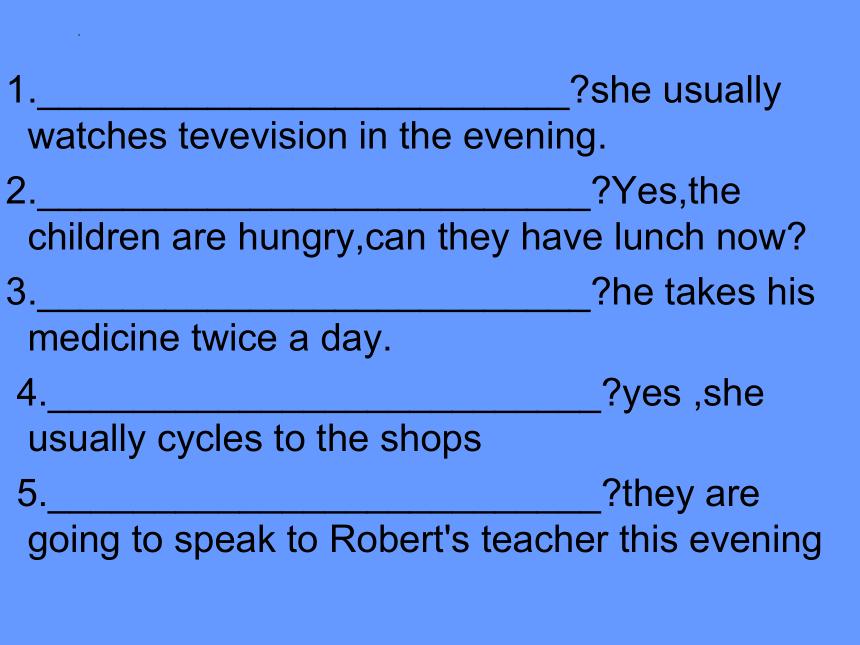
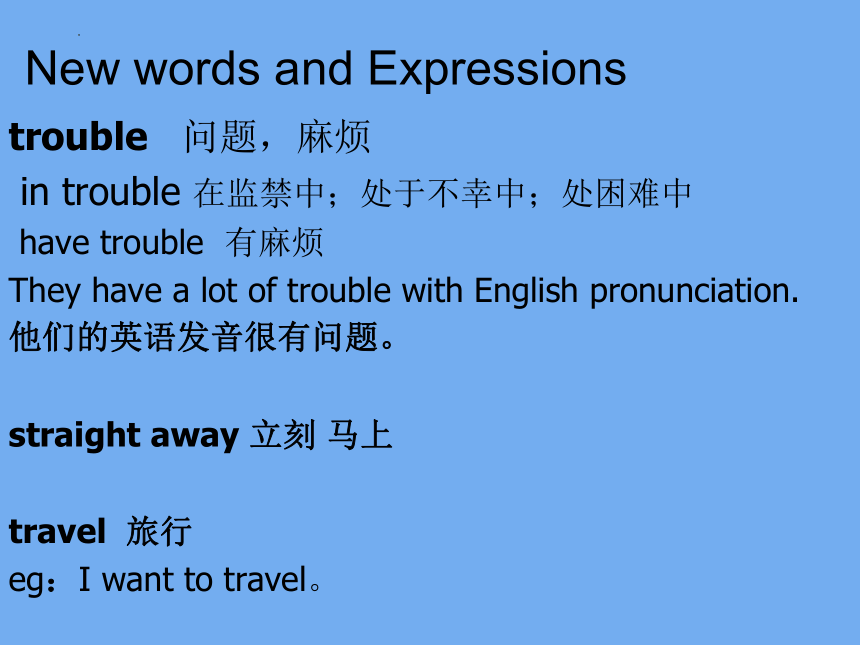
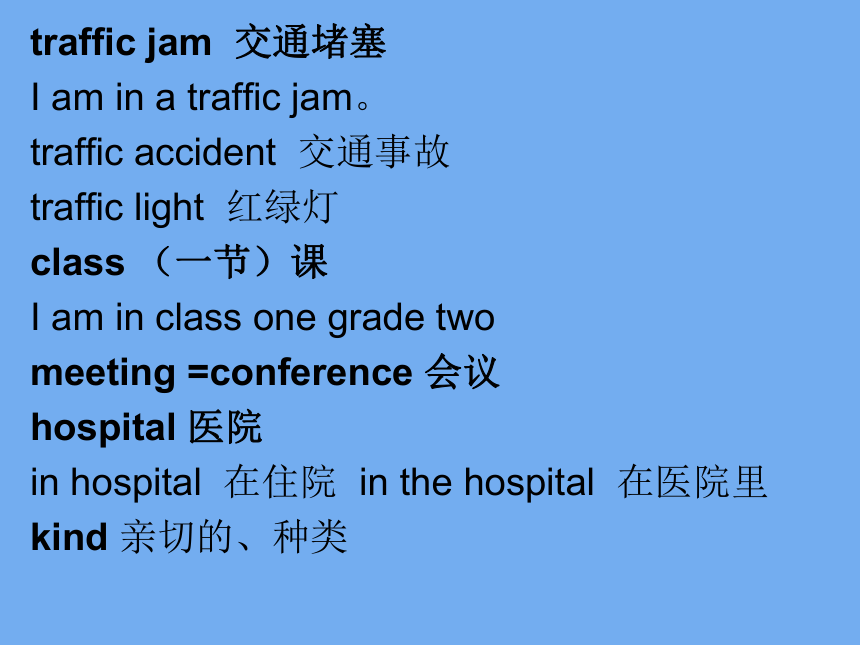

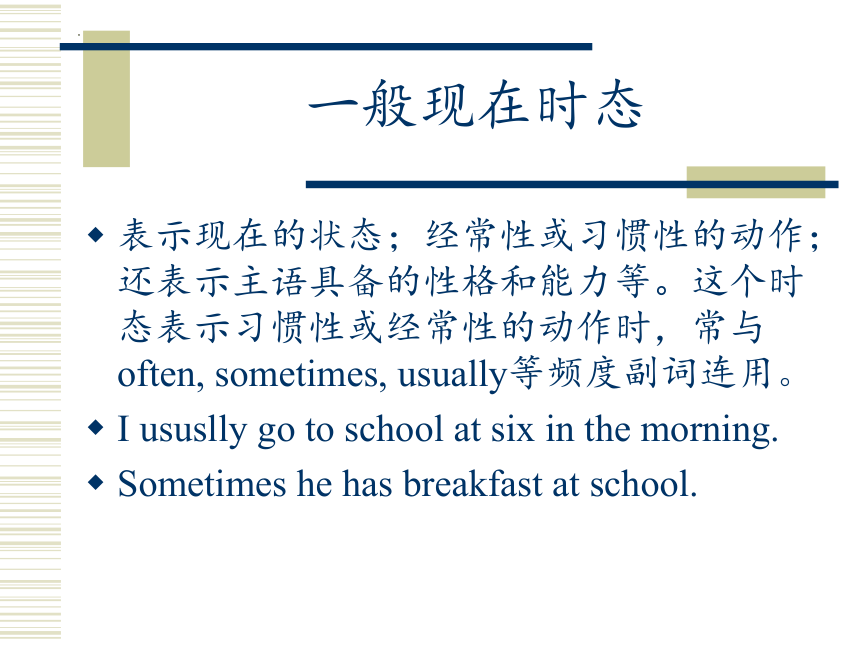
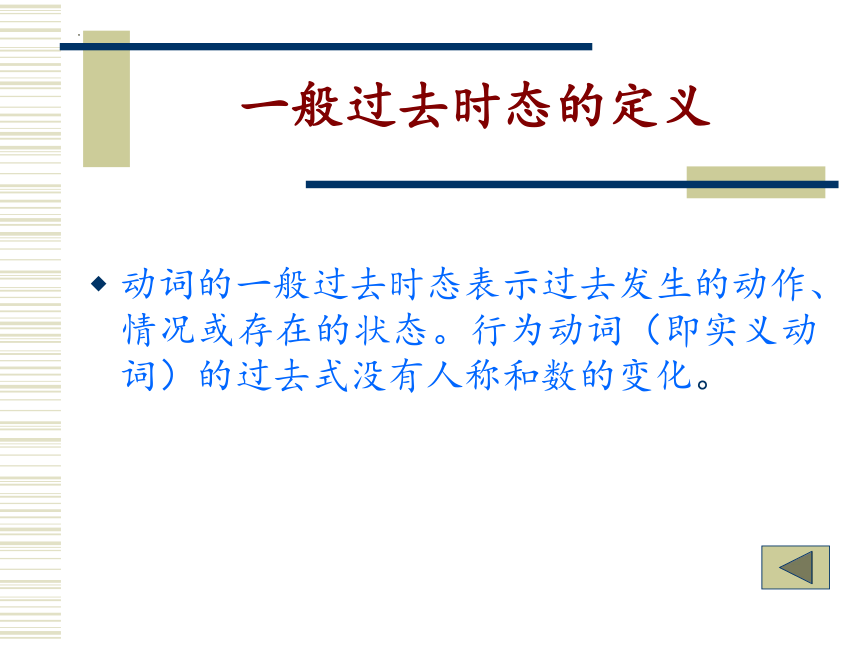
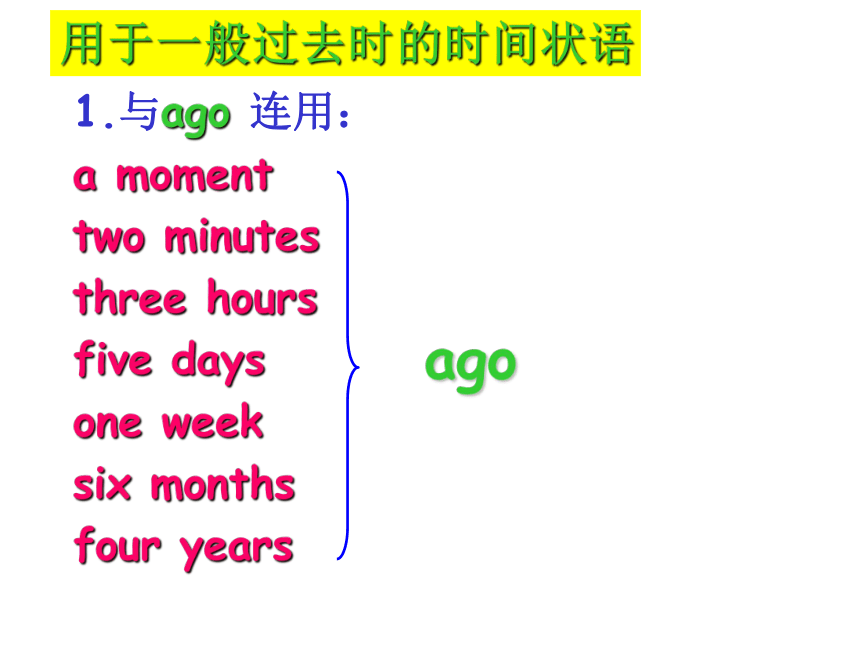
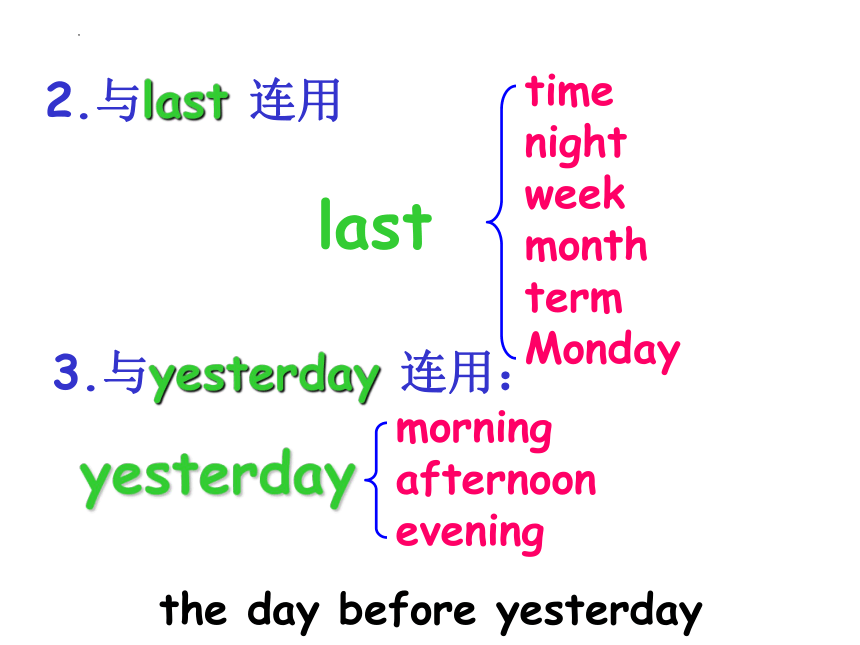
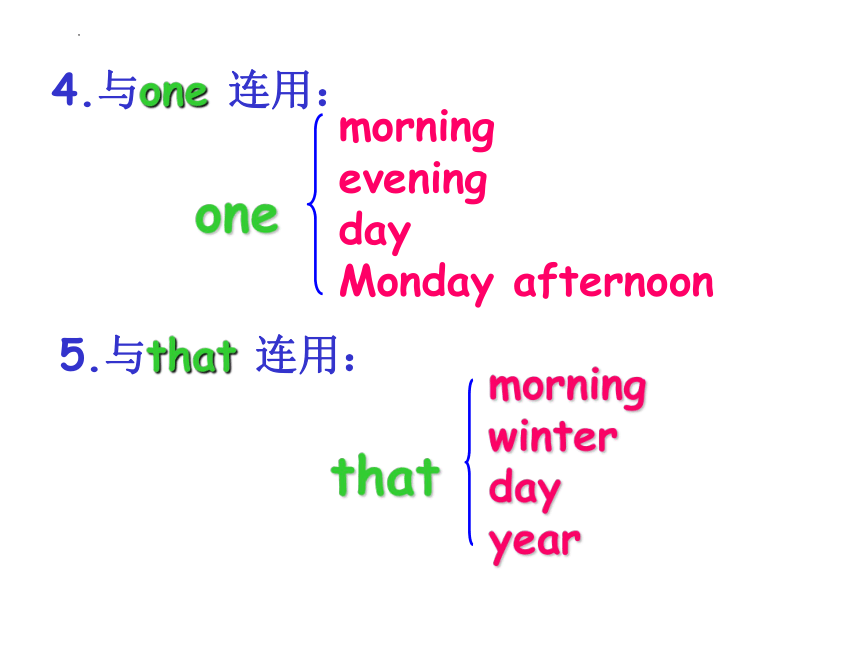
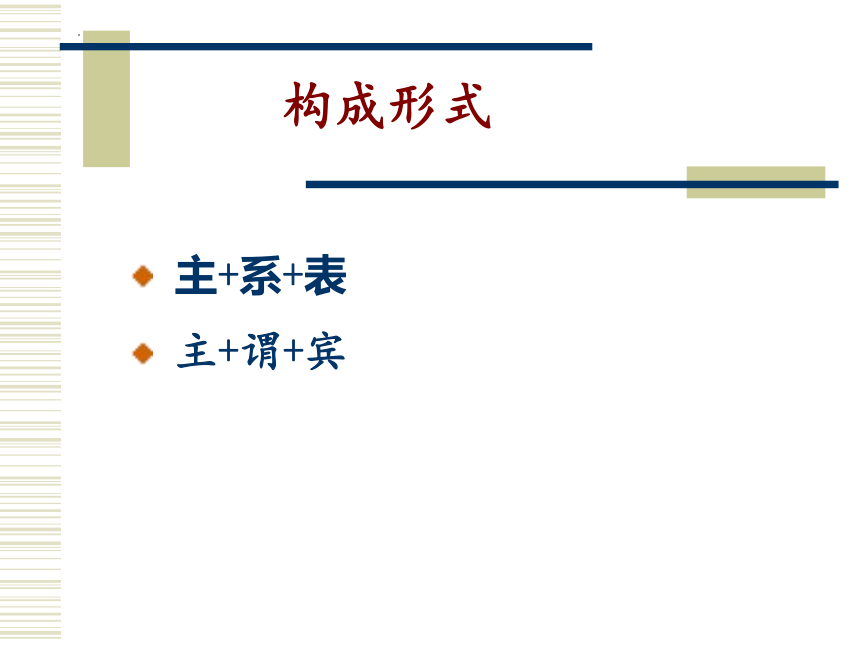
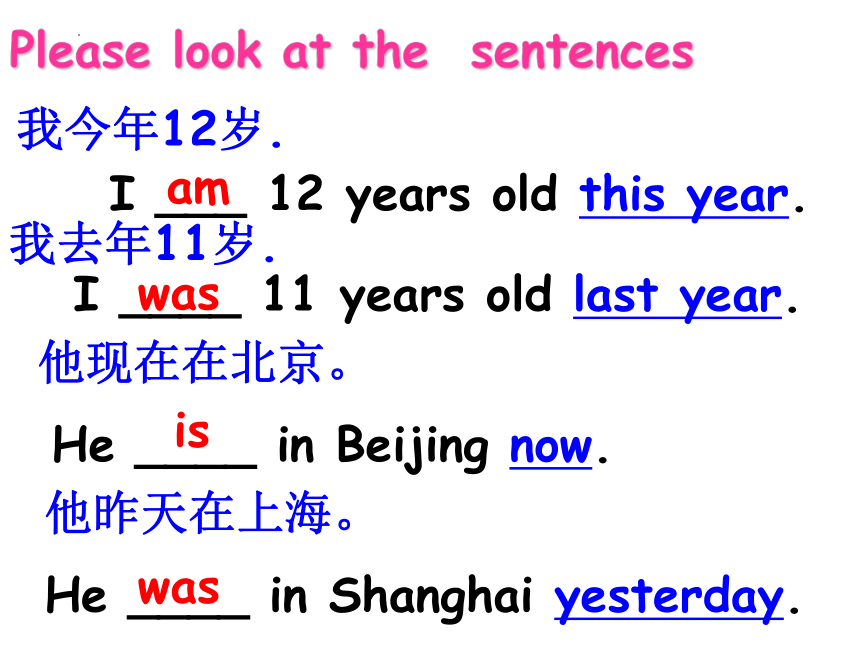
文档简介
(共50张PPT)
Unit 11
We all have our troubles
1._________________________ she usually watches tevevision in the evening.
2.__________________________ Yes,the children are hungry,can they have lunch now
3.__________________________ he takes his medicine twice a day.
4.__________________________ yes ,she usually cycles to the shops
5.__________________________ they are going to speak to Robert's teacher this evening
New words and Expressions
trouble 问题,麻烦
in trouble 在监禁中;处于不幸中;处困难中
have trouble 有麻烦
They have a lot of trouble with English pronunciation.
他们的英语发音很有问题。
straight away 立刻 马上
travel 旅行
eg:I want to travel。
traffic jam 交通堵塞
I am in a traffic jam。
traffic accident 交通事故
traffic light 红绿灯
class (一节)课
I am in class one grade two
meeting =conference 会议
hospital 医院
in hospital 在住院 in the hospital 在医院里
kind 亲切的、种类
一般过去时态
一般现在时态
表示现在的状态;经常性或习惯性的动作;还表示主语具备的性格和能力等。这个时态表示习惯性或经常性的动作时,常与often, sometimes, usually等频度副词连用。
I ususlly go to school at six in the morning.
Sometimes he has breakfast at school.
一般过去时态的定义
动词的一般过去时态表示过去发生的动作、情况或存在的状态。行为动词(即实义动词)的过去式没有人称和数的变化。
1.与ago 连用:
a moment
two minutes
three hours
five days
one week
six months
four years
ago
用于一般过去时的时间状语
last
time
night
week
month
term
Monday
yesterday
morning
afternoon
evening
the day before yesterday
2.与last 连用
3.与yesterday 连用:
4.与one 连用:
one
morning
evening
day
Monday afternoon
5.与that 连用:
that
morning
winter
day
year
构成形式
主+系+表
主+谓+宾
I ___ 12 years old this year.
我去年11岁.
I ____ 11 years old last year.
He ____ in Beijing now.
他昨天在上海。
He ____ in Shanghai yesterday.
他现在在北京。
Please look at the sentences
我今年12岁.
am
was
is
was
They ____ in China today.
他们今天在中国。
They ____ in Japan yesterday.
他们昨天在日本。
are
were
am/ is
was
are
were
Robert
at home/(at school)
yesterday
Polly
in town/
(at home)
yesterday morning
Anna /at her desk.
(at the shops)
William was in a traffic jam.
He wasn`t in the coffice yesterday evening.
Where ***** / when *****
Was Lucy in bed last night
Yes ,she is
She wasn`t in class last night.
Annie was in town ,
she wasn`t in the country the day before yesterday
They were at the meeting.
Were they at the meeting
Yes ,they were./No,they weren`t.
Mr .Ford
in hospital
/at work
lask week
Mr .Ford was in hospital last week.
Was he at work last week yes/no.
Mr .Ford wasn`t at work last week.
Was he/she ********
Yes ,he/she was. No ,he/she wasn`t.
Were you /they ******
Yes ,they were. No ,they weren`t.
构成形式
主+系+表
主+谓+宾
规则动词过去式的构成
1、一般动词原形末尾加-ed。如:look→looked, stay→stayed ;
2、以e结尾的动词只加-d。如:hope→hoped, live→lived;
3、末尾只有一个辅音字母结尾的重读闭音节的动词,应先双写这个辅音字母,再加-ed.如:stop→stopped, plan(计划) →planned;
4、结尾是“辅音字母+y”的动词,先将y改为i,再加-ed. 如:study→studied, carry→carried.
每天,早餐我吃鸡蛋和牛奶。
I ____ eggs and milk for breakfast every morning.
昨天,早餐我吃面条。
I ____ noodles for breakfast yesterday morning.
他每天都吃水果。
He _____ fruit every day.
昨天他吃了3个苹果。
He _____ 3 apples yesterday.
have/ has
had
have
has
had
had
I get up at 6:30 every morning.
I ___ up at 9:00 last Sunday.
He plays football every afternoon.
He _____ basketball yesterday afternoon.
He does his homework every evening.
He ____ his homework last night.
动词原形、第三人称单数
动词过去式
got
played
did
They don’t watch TV in the evening.
They _________ TV last night.
She doesn’t play basketball after school.
She _________ basketball after school yesterday.
Do you go to school on foot every day
___ you __ to school on foot yesterday.
Does he go to school by bus every day
___ he ___to school by bus yesterday
don’t/ doesn’t
do/ does
didn’t
did
didn’t watch
didn’t play
Did
Did
go
go
谓语构成
1.动词 be
2.动词 have, has
3.助动词do, does
4.行为动词用过去式
was , were
had
did
一般过去时以动词的过去式来表示,没有人称和数的变化.(was,were除外)
I went to school yesterday.
They went to school yesterday.
行为动词一般过去时的否定式
一般过去时的否定式是在动词原形前加助动词did not (didn’t).
主语+didn’t+动词原形
I _________ them the news.
I ____ (tell) them the news yesterday.
didn’t tell
told
行为动词一般过去时的疑问式
一般过去时的一般疑问式在句首加助动词did
Did+主语+动词原形……?
They ______(finish) their work at four.
一般疑问句:
____ they _____ their work at four
Yes, they _____. No, they _____.
finished
Did
finish
did
didn’t
行为动词一般过去时的疑问式
一般过去时的特殊疑问式
疑问词+did+主语+动词原形……?
They finished their work at four.
A
B
对划线部分提问
A:
B:
What did they do at four
When did they finish their work
T
注意
1.外加助动词did后,动词须返回原形。
Did he went to school yesterday
Did he go to school yesterday
F
2.简略回答用助动词did/didn’t代替行为动词。
Did he find the boy yesterday
-Yes, he did.
-No, he did not (didn’t).
1. look
2. live
3. stop
4. go
5. hope
6. trip
7. call
8. eat
9. want
10. are
11. go
12. have
13. do 14.get
e
16. say 17.see
18. put
19. read 20.take
looked
lived
stopped
went
hoped
tripped
called
ate
wanted
were
went
has
did
got
came
said
saw
put
read
took
写出下列动词的过去式
21.buy 22.sing 23.hear
24.make
25. find 26.break 27.think
28.fall 29.write
30.be
bought
made
found
broke
thought
fell
wrote
was/were
sang
heard
Exercises
1.I ____ the number down on a piece of paper a moment ago.
A. write B. writed
C. wrote D. writing
2. Everything ___ ready before Father came.
A. were B. was
C. is D. are
C
B
3.He always _____me last term.
A. helped B. helps
C. helping D. help
A
1.Where`s Jack going first thing tomorrow
2.What does Anna want to do
3.what do they have in their life
Listen and answer
time Name The week before last Last week
The day after tomorrow
Anna
Paul
www,
At her desk
At her desk
At her desk
Washington
Paris
Paris
一般过去时态的肯定句、否定句、和疑问句
(1).肯定句由“主语+动词的过去式”构成.例如:
他两年前是个小学生.
昨天我的手表工作很正常.
(2).否定句由“主语+be(was/were)+not…”或
“主语+didn’t+动词原形构成。例如:
他两年前不是个小学生。
昨天我的手表坏了。
He was a pupil two years ago.
My watch worked well yesterday.
He wasn’t a pupil two years ago.
My watch didn’t work yesterday.
(3).一般疑问句:提前be或者加助动词did.例如:
他两年前是干什么的?
他什么时候是小学生?
你手表昨天走得怎么样?
他两年前是个小学生吗?
昨天你的手表工作正常吗?
(4).特殊疑问句由“特殊疑问词+一般疑问句”构成.例如
Was he a pupil two years ago
Did your watch work well yesterday
What was he two years ago.
When was he he a pupil
How did your watch work yesterday
I.用动词的适当形式填空
1,She often _____(go) to school at eight o’clock.
2,They are _____________ supper. (eat)
3,He usually _______ up at 17:00.(get )
4,She _______(live) in Beijing last year.
5,Sally ____________________to the zoo tomorrow.(go)
6,___(be)there a fly (苍蝇) on the table just now
goes
eating
gets
lived
will go (is going to go)
Was
7,Mary __________(read) English yesterday morning.
8,There _____(be) no one here a moment ago.
9,I ______________(call) Mike this morning.
10,I listened but ____________(hear) nothing.
11,Tom ________(begin) to learn Chinese last year.
12,Last week we _______(pick) many apples on the farm.
13,My mother ___________(not do) housework yesterday.
read
was
called
heard
began
picked
didn’t
I.改错题
How is Jane yesterday _____________________
He gets to school at six yesterday. ____________________________
He often goes home at 6:00 last month. ____________________________
I can fly kites seven years ago. ______________________________
Did you saw him just now. ____________________________________
Tom wasn’t watch TV last night. ____________________________________
I did my homework later . ____________________________________
He wait for you three hours ago. ____________________________________
Who find it just now _____
was
got
went
could
see
didn’t
will do(am going to do)
waited
found
III.句型转换
They came to China in 1990.(变一般疑问句)
__________ they ________ to China in 1990
2.I was ill for two days last week (同上)
________ you ill for two days last week
3. The twins go to school on foot every day. (同上)
_________ the twins _______ to school on foot every day
4.She washed the clothes last Sunday. ( 变否定句)
She _________ ________ the clothes last Sunday
Did
come
Were
Do
go
didn’t
wash
5. She is going to go shopping tomorrow. (变否定句)
_____________________________________
6. My mother likes her students. (变一般疑问句)
_______________________________________
7. Do you watch TV on Sunday (用last Sunday 改写成过去时态的句子)
______________________________________________
8. Wei Hua bought a new pen yesterday. (变否定句)
She ________ ________ a new pen yesterday.
She isn’t going to go shopping tomorrow.
My mother doesn’t like her students.
Did you watch TV on Sunday last Sunday.
didn’t
buy
IV.译句子
那个女孩子正在树下唱歌。_________________________________________________
他们准备做什么? ________________________________________________________
你昨天做什么了?_________________________________________________________
他的妈妈每天做什么?______________________________________________________
她昨天在这。_________________________________________
6.他们上周六去公园了。___________________
That girl is singing under the tree.
What are they going to do
What did you do yesterday
What does his mother do every day
She was here yesterday.
They went to the park last Saturday.
规则动词过去式-ed的发音
1.在以清辅音结尾的规则动词后,
-ed读作/ t /
work
/w3:k/
ed
t/
2.在以浊辅音或原音结尾的规则动词后, -ed读作/d /
play
/pleI /
live
/lIv /
ed
d/
ed
d/
3.在以/t/或/d/结尾的规则动词后,
-ed读作/Id /
visit
/’vIzIt /
ed
Id/
finished
enjoyed
shouted
moved
helped
wanted
called
needed
/t/
/d/
/Id/
/d/
/d/
/t/
/Id/
/Id/
5–ed(或-d)的读音:在清辅音结尾的词后读[t].如:work→worked [w : kt], help→helped[helpt]; 在浊辅音和元音后读[d]。如:call→called[k: ld], play→played[pleid]; 在[t]和[d]音后面发[id]。如:want→wanted[w ntid],need→needed[ni:did].
Taday`s homework:
1. Copy the new words and remember them.
2. Finish the exercises.
3. Recite the five sentences.
Don`t forget the sign of your parents !
Unit 11
We all have our troubles
1._________________________ she usually watches tevevision in the evening.
2.__________________________ Yes,the children are hungry,can they have lunch now
3.__________________________ he takes his medicine twice a day.
4.__________________________ yes ,she usually cycles to the shops
5.__________________________ they are going to speak to Robert's teacher this evening
New words and Expressions
trouble 问题,麻烦
in trouble 在监禁中;处于不幸中;处困难中
have trouble 有麻烦
They have a lot of trouble with English pronunciation.
他们的英语发音很有问题。
straight away 立刻 马上
travel 旅行
eg:I want to travel。
traffic jam 交通堵塞
I am in a traffic jam。
traffic accident 交通事故
traffic light 红绿灯
class (一节)课
I am in class one grade two
meeting =conference 会议
hospital 医院
in hospital 在住院 in the hospital 在医院里
kind 亲切的、种类
一般过去时态
一般现在时态
表示现在的状态;经常性或习惯性的动作;还表示主语具备的性格和能力等。这个时态表示习惯性或经常性的动作时,常与often, sometimes, usually等频度副词连用。
I ususlly go to school at six in the morning.
Sometimes he has breakfast at school.
一般过去时态的定义
动词的一般过去时态表示过去发生的动作、情况或存在的状态。行为动词(即实义动词)的过去式没有人称和数的变化。
1.与ago 连用:
a moment
two minutes
three hours
five days
one week
six months
four years
ago
用于一般过去时的时间状语
last
time
night
week
month
term
Monday
yesterday
morning
afternoon
evening
the day before yesterday
2.与last 连用
3.与yesterday 连用:
4.与one 连用:
one
morning
evening
day
Monday afternoon
5.与that 连用:
that
morning
winter
day
year
构成形式
主+系+表
主+谓+宾
I ___ 12 years old this year.
我去年11岁.
I ____ 11 years old last year.
He ____ in Beijing now.
他昨天在上海。
He ____ in Shanghai yesterday.
他现在在北京。
Please look at the sentences
我今年12岁.
am
was
is
was
They ____ in China today.
他们今天在中国。
They ____ in Japan yesterday.
他们昨天在日本。
are
were
am/ is
was
are
were
Robert
at home/(at school)
yesterday
Polly
in town/
(at home)
yesterday morning
Anna /at her desk.
(at the shops)
William was in a traffic jam.
He wasn`t in the coffice yesterday evening.
Where ***** / when *****
Was Lucy in bed last night
Yes ,she is
She wasn`t in class last night.
Annie was in town ,
she wasn`t in the country the day before yesterday
They were at the meeting.
Were they at the meeting
Yes ,they were./No,they weren`t.
Mr .Ford
in hospital
/at work
lask week
Mr .Ford was in hospital last week.
Was he at work last week yes/no.
Mr .Ford wasn`t at work last week.
Was he/she ********
Yes ,he/she was. No ,he/she wasn`t.
Were you /they ******
Yes ,they were. No ,they weren`t.
构成形式
主+系+表
主+谓+宾
规则动词过去式的构成
1、一般动词原形末尾加-ed。如:look→looked, stay→stayed ;
2、以e结尾的动词只加-d。如:hope→hoped, live→lived;
3、末尾只有一个辅音字母结尾的重读闭音节的动词,应先双写这个辅音字母,再加-ed.如:stop→stopped, plan(计划) →planned;
4、结尾是“辅音字母+y”的动词,先将y改为i,再加-ed. 如:study→studied, carry→carried.
每天,早餐我吃鸡蛋和牛奶。
I ____ eggs and milk for breakfast every morning.
昨天,早餐我吃面条。
I ____ noodles for breakfast yesterday morning.
他每天都吃水果。
He _____ fruit every day.
昨天他吃了3个苹果。
He _____ 3 apples yesterday.
have/ has
had
have
has
had
had
I get up at 6:30 every morning.
I ___ up at 9:00 last Sunday.
He plays football every afternoon.
He _____ basketball yesterday afternoon.
He does his homework every evening.
He ____ his homework last night.
动词原形、第三人称单数
动词过去式
got
played
did
They don’t watch TV in the evening.
They _________ TV last night.
She doesn’t play basketball after school.
She _________ basketball after school yesterday.
Do you go to school on foot every day
___ you __ to school on foot yesterday.
Does he go to school by bus every day
___ he ___to school by bus yesterday
don’t/ doesn’t
do/ does
didn’t
did
didn’t watch
didn’t play
Did
Did
go
go
谓语构成
1.动词 be
2.动词 have, has
3.助动词do, does
4.行为动词用过去式
was , were
had
did
一般过去时以动词的过去式来表示,没有人称和数的变化.(was,were除外)
I went to school yesterday.
They went to school yesterday.
行为动词一般过去时的否定式
一般过去时的否定式是在动词原形前加助动词did not (didn’t).
主语+didn’t+动词原形
I _________ them the news.
I ____ (tell) them the news yesterday.
didn’t tell
told
行为动词一般过去时的疑问式
一般过去时的一般疑问式在句首加助动词did
Did+主语+动词原形……?
They ______(finish) their work at four.
一般疑问句:
____ they _____ their work at four
Yes, they _____. No, they _____.
finished
Did
finish
did
didn’t
行为动词一般过去时的疑问式
一般过去时的特殊疑问式
疑问词+did+主语+动词原形……?
They finished their work at four.
A
B
对划线部分提问
A:
B:
What did they do at four
When did they finish their work
T
注意
1.外加助动词did后,动词须返回原形。
Did he went to school yesterday
Did he go to school yesterday
F
2.简略回答用助动词did/didn’t代替行为动词。
Did he find the boy yesterday
-Yes, he did.
-No, he did not (didn’t).
1. look
2. live
3. stop
4. go
5. hope
6. trip
7. call
8. eat
9. want
10. are
11. go
12. have
13. do 14.get
e
16. say 17.see
18. put
19. read 20.take
looked
lived
stopped
went
hoped
tripped
called
ate
wanted
were
went
has
did
got
came
said
saw
put
read
took
写出下列动词的过去式
21.buy 22.sing 23.hear
24.make
25. find 26.break 27.think
28.fall 29.write
30.be
bought
made
found
broke
thought
fell
wrote
was/were
sang
heard
Exercises
1.I ____ the number down on a piece of paper a moment ago.
A. write B. writed
C. wrote D. writing
2. Everything ___ ready before Father came.
A. were B. was
C. is D. are
C
B
3.He always _____me last term.
A. helped B. helps
C. helping D. help
A
1.Where`s Jack going first thing tomorrow
2.What does Anna want to do
3.what do they have in their life
Listen and answer
time Name The week before last Last week
The day after tomorrow
Anna
Paul
www,
At her desk
At her desk
At her desk
Washington
Paris
Paris
一般过去时态的肯定句、否定句、和疑问句
(1).肯定句由“主语+动词的过去式”构成.例如:
他两年前是个小学生.
昨天我的手表工作很正常.
(2).否定句由“主语+be(was/were)+not…”或
“主语+didn’t+动词原形构成。例如:
他两年前不是个小学生。
昨天我的手表坏了。
He was a pupil two years ago.
My watch worked well yesterday.
He wasn’t a pupil two years ago.
My watch didn’t work yesterday.
(3).一般疑问句:提前be或者加助动词did.例如:
他两年前是干什么的?
他什么时候是小学生?
你手表昨天走得怎么样?
他两年前是个小学生吗?
昨天你的手表工作正常吗?
(4).特殊疑问句由“特殊疑问词+一般疑问句”构成.例如
Was he a pupil two years ago
Did your watch work well yesterday
What was he two years ago.
When was he he a pupil
How did your watch work yesterday
I.用动词的适当形式填空
1,She often _____(go) to school at eight o’clock.
2,They are _____________ supper. (eat)
3,He usually _______ up at 17:00.(get )
4,She _______(live) in Beijing last year.
5,Sally ____________________to the zoo tomorrow.(go)
6,___(be)there a fly (苍蝇) on the table just now
goes
eating
gets
lived
will go (is going to go)
Was
7,Mary __________(read) English yesterday morning.
8,There _____(be) no one here a moment ago.
9,I ______________(call) Mike this morning.
10,I listened but ____________(hear) nothing.
11,Tom ________(begin) to learn Chinese last year.
12,Last week we _______(pick) many apples on the farm.
13,My mother ___________(not do) housework yesterday.
read
was
called
heard
began
picked
didn’t
I.改错题
How is Jane yesterday _____________________
He gets to school at six yesterday. ____________________________
He often goes home at 6:00 last month. ____________________________
I can fly kites seven years ago. ______________________________
Did you saw him just now. ____________________________________
Tom wasn’t watch TV last night. ____________________________________
I did my homework later . ____________________________________
He wait for you three hours ago. ____________________________________
Who find it just now _____
was
got
went
could
see
didn’t
will do(am going to do)
waited
found
III.句型转换
They came to China in 1990.(变一般疑问句)
__________ they ________ to China in 1990
2.I was ill for two days last week (同上)
________ you ill for two days last week
3. The twins go to school on foot every day. (同上)
_________ the twins _______ to school on foot every day
4.She washed the clothes last Sunday. ( 变否定句)
She _________ ________ the clothes last Sunday
Did
come
Were
Do
go
didn’t
wash
5. She is going to go shopping tomorrow. (变否定句)
_____________________________________
6. My mother likes her students. (变一般疑问句)
_______________________________________
7. Do you watch TV on Sunday (用last Sunday 改写成过去时态的句子)
______________________________________________
8. Wei Hua bought a new pen yesterday. (变否定句)
She ________ ________ a new pen yesterday.
She isn’t going to go shopping tomorrow.
My mother doesn’t like her students.
Did you watch TV on Sunday last Sunday.
didn’t
buy
IV.译句子
那个女孩子正在树下唱歌。_________________________________________________
他们准备做什么? ________________________________________________________
你昨天做什么了?_________________________________________________________
他的妈妈每天做什么?______________________________________________________
她昨天在这。_________________________________________
6.他们上周六去公园了。___________________
That girl is singing under the tree.
What are they going to do
What did you do yesterday
What does his mother do every day
She was here yesterday.
They went to the park last Saturday.
规则动词过去式-ed的发音
1.在以清辅音结尾的规则动词后,
-ed读作/ t /
work
/w3:k/
ed
t/
2.在以浊辅音或原音结尾的规则动词后, -ed读作/d /
play
/pleI /
live
/lIv /
ed
d/
ed
d/
3.在以/t/或/d/结尾的规则动词后,
-ed读作/Id /
visit
/’vIzIt /
ed
Id/
finished
enjoyed
shouted
moved
helped
wanted
called
needed
/t/
/d/
/Id/
/d/
/d/
/t/
/Id/
/Id/
5–ed(或-d)的读音:在清辅音结尾的词后读[t].如:work→worked [w : kt], help→helped[helpt]; 在浊辅音和元音后读[d]。如:call→called[k: ld], play→played[pleid]; 在[t]和[d]音后面发[id]。如:want→wanted[w ntid],need→needed[ni:did].
Taday`s homework:
1. Copy the new words and remember them.
2. Finish the exercises.
3. Recite the five sentences.
Don`t forget the sign of your parents !
同课章节目录
- Unit 1 Linda comes to London
- Unit 2 Good luck on Sunday
- Unit 3 Is this yours?
- Unit 4 The top three percent
- Unit 5 All about ants!
- Unit 6 An elegant size
- Unit 7 A good example
- Unit 8 A nice quiet afternoon
- Unit 9 Do Your own thing
- Unit 10 Tomorrow's another day!
- Unit 11 We all have our troubles
- Unit 12 The London bus
- Unit 13 The kalenjin
- Unit 14 Chocolate haven!
- Unit 15 It's a mystery to me!
